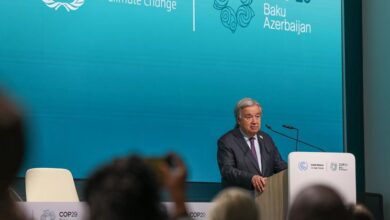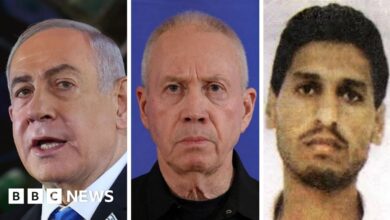Opportunities and warnings for Africa
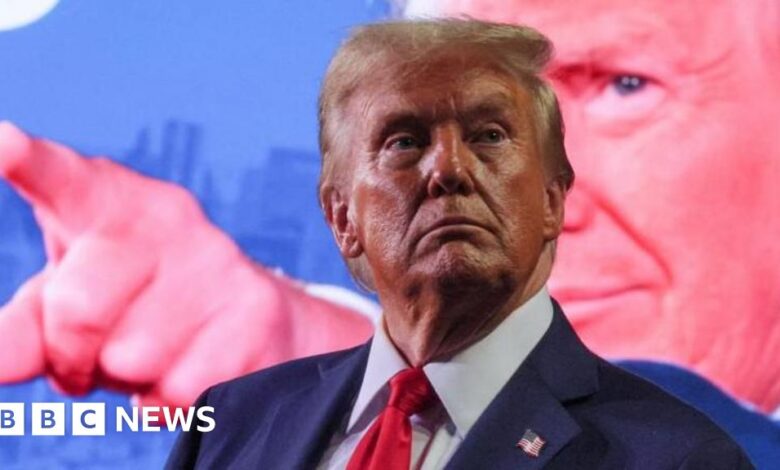
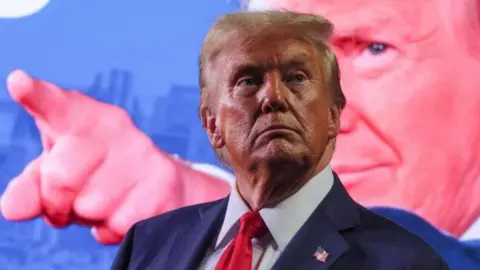 Reuters
ReutersIt is difficult to predict what decisions US President-elect Donald Trump will make when he returns to the White House.
But one thing seems unlikely to change: his dislike of patient, principled diplomacy as a means to peace and his preference for transactional politics and populist gestures.
This presents opportunities and dangers in some areas of Africa.
Eight years ago, the Obama administration worked with the African Union (AU) to change United Nations (UN) regulations on funding for peacekeeping forces to place African missions on an African basis. solid financial base.
The AU Commission has worked with the United Nations and other multilateral organizations to build an “African peace and security architecture” that ranges from proactive diplomacy to prevent potential conflicts to coordinated mediation efforts and peacekeeping operations, all underpinned by the norms and principles enshrined in the United Nations Charter. and the AU Constitution Act.
It seems like a long time ago.
More robust peacekeeping plans evaporated during the transition to Trump’s first administration.
Since then, no new UN or AU peacekeeping missions have been authorized. Some – including in Darfur, Sudan and Mali – have been closed and others downsized.
The Biden administration has not reversed this trend.
The idea of the “liberal peace” — that peace, democracy, justice and open markets all go hand in hand — has long been a strong theme of U.S. global strategy.
The AU advocates its multilateralism but refuses to preach human rights and democracy, and is divided over Western military interventions such as in Libya.
Some African leaders like Trump’s candor and focus on results.
The “Trump Doctrine” for the Middle East and Africa sidelined multilateralism in favor of trading deals with US allies in Egypt, Morocco, Saudi Arabia, the United Arab Emirates first (UAE) and above all Israel.
Prime Minister Benjamin Netanyahu and UAE President Mohamed bin Zayed laid out the strategy for the Abraham Accords, and Trump basked in the glory of Arab countries signing up.
Trump’s other consistent positions have been hostility toward Chinese influence on the continent and an aversion to the deployment of American troops.
 Getty Images
Getty ImagesAt the request of Egyptian President Abdul Fattah al-Sisi – described by Trump as “my favorite dictator” – then-Treasury Secretary Steven Mnuchin took responsibility for mediating Egypt’s dispute with Ethiopia to the waters of the Nile River.
The immediate issue is how much water the Ethiopian Renaissance Grand Dam will hold back as it nears completion.
As talks falter, Washington puts its thumb on the scale, suspending aid to Ethiopia, while Trump suggests that Egypt can “explode” the dam.
The US recognized Morocco’s claim to Western Sahara in exchange for Rabat signing the Abraham Accords and thereby recognizing Israel.
In an era of “liberal peace”, an agreement to end civil war entails the drafting of a democratic constitution, along with measures to disarm and demobilize rival armies, transitional justice and reconciliation, as well as aid-funded programs to bring peace benefits to countries. miserable masses.
The Trump administration first favored face-to-face deal-making, in which autocrats hammered out a deal privately over the counter. Scholars call this “illiberal peace”.
When then-Secretary of State Mike Pompeo visited Sudan after the popular revolution that led to the overthrow of Islamist military ruler Omar al-Bashir, his main agenda was a single transaction Simplified: The US will lift sanctions when Sudan agrees to sign the Abraham Accords.
In October 2020, the White House announced that President Trump “brokered a historic peace agreement” between Israel and Sudan.
After deals with Bahrain and the UAE, and weeks before Americans vote in the presidential election, this is Trump’s “October surprise.”
It is too late to save Sudan from the economic crisis that crushed its democratic experiment and collapsed after Trump lost to Joe Biden.
But it’s fair to assume that a second Trump administration will continue this way.
The exact arrangements and transactions cannot be predicted and will largely depend on the individuals appointed to key positions. But the “liberal peace” is now dead and buried.
Sudan is currently home to Africa’s biggest war and its biggest famine in decades. There is no sign that Trump is concerned.
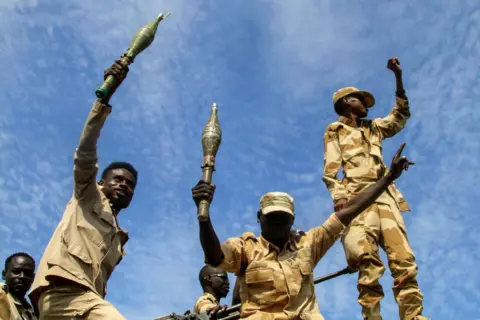 Getty Images
Getty ImagesThe biggest obstacle to peace is that the UAE supports one side with weapons and cash while Egypt and Saudi Arabia support the other. There is no prospect for peace while this continues.
For those Arab power brokers, Sudan is just one factor in their geostrategic calculus, ranking below Israel-Palestine, Iran and relations with Washington.
But if there is a reshuffling of the political cards in the Middle East, a bargain over Sudan could be a byproduct, even an opportunity for Trump to shine in the light of a peacemaker surprise.
It will not end violence, let alone usher in democracy, but it will open space for serious negotiations.
The same calculation applies to Ethiopia and its fractious relationship with the Egyptian-led coalition that includes Eritrea and Somalia.
Along with a host of African leaders, Ethiopian Prime Minister Abiy Ahmed relies heavily on the UAE’s generosity. Tensions in the Horn of Africa will ease if Egypt and the UAE adjust their strategies.
The Biden administration’s policy toward the Horn of Africa is neither committed to principled multilateralism nor willing to use its leverage with the Gulf states.
Its messengers could only win small victories such as halting fighting or opening checkpoints for aid convoys.
The tangled wars in Sudan, Ethiopia and neighboring countries call for bold action — and if so inclined, Trump could cut the Gordian knot.
But the risk of fire is very high.
Trump’s White House will not be able to rein in the aggressive tendencies of Middle East power brokers or African leaders, and – especially in the US policy vacuum of the next few months – any of those leaders could launch war, confident that America would not respond. .
During his first term, Trump showed no interest in America’s military footprint in Africa.
It seemed that on a whim, he gave the order withdraw US troops from Somaliawhere they participated in the fight against the jihadist group al-Shabab – a decision that was reversed by the Biden administration.
It is unlikely that Trump will pay attention to the Pentagon’s operations against jihadists there or in the West African Sahel, unless there is a high-profile incident that results in American casualties.
And America’s Middle Eastern allies will want the United States to retain its military base in Djibouti.
Reports of collusion between Yemen’s Houthi forces and al-Shabab, raising the risk of attacks in East Africa or shipping in the Indian Ocean, could pique US interest for military operations.
Alternatively, missions could be assigned to allies such as the UAE or private military contractors.
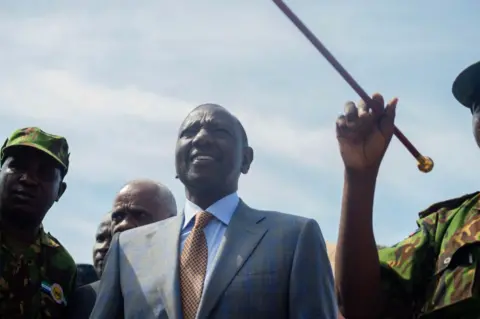 AFP
AFPKenyan President William Ruto’s relationship with Biden will not do him any good, but Kenya’s new status as a “major non-NATO ally” – and a contributor to the Haitian police – will likely remain in good standing within the Department of Defense.
West Africa today is the site of the world’s most active jihadist movements as well as a wave of putschists who have broken deals with Russia’s security agency, the Wagner Group, which has now merged into their Afrika Korps.
If Trump views West Africa through the lens of relations with Moscow and his planned deal with President Vladimir Putin on the war in Ukraine, it will introduce a wild card into the region’s politics.
But tensions will arise because his ally, Morocco, has its own ambitions for strategic leadership across West Africa.
It is a major non-NATO ally and has been wary of Russian influence in Algeria, Libya and the Sahel – contributing to a mix that will be stirred up if Trump cuts a deal with Putin.
Transactional politics implies cutting deals with coup leaders and warlords whose crimes are in evidence.
AU principles such as outlawing unconstitutional changes in government will be disregarded.
Nigerian President Bola Tinubu may prefer Biden, but he is familiar with Trump’s political style and will seek a formula to keep America on side in the fight against the jihadist group Boko Haram.
In February, just weeks after the presidential inauguration in Washington, African leaders will meet in Addis Ababa, Ethiopia to elect a new president of the AU Commission.
The outgoing president, former Chadian Prime Minister Moussa Faki Mahamat, is content to be a trader in the political bazaar of the Trump-Biden years.
His successor will face the challenge that the best formula for Africa’s peace and security lies in norms-based multilateral cooperation, but 2025 will be a bad year for recovery. that project.
Alex de Waal is executive director of the World Peace Foundation at the Fletcher School of Law and Diplomacy at Tufts University, USA.


North America correspondent Anthony Zurcher gets the inside scoop on the White House race in his twice-weekly US Elections Unspun newsletter. Readers in the UK can Register here. Those outside the UK can Register here.
 Getty Images/BBC
Getty Images/BBC

